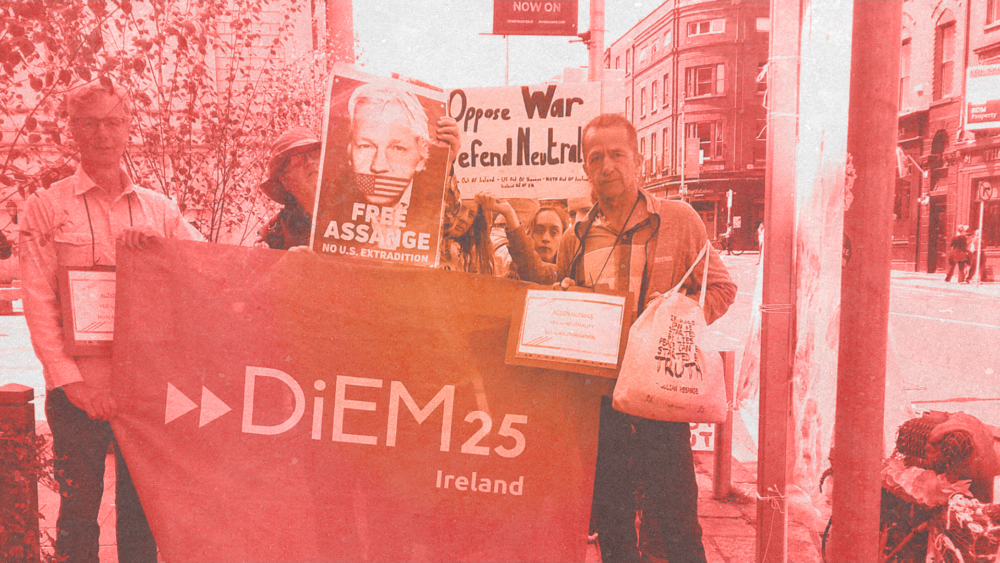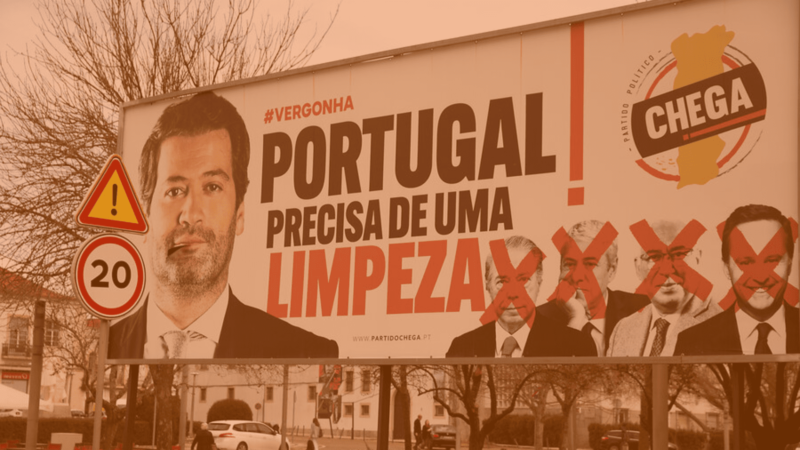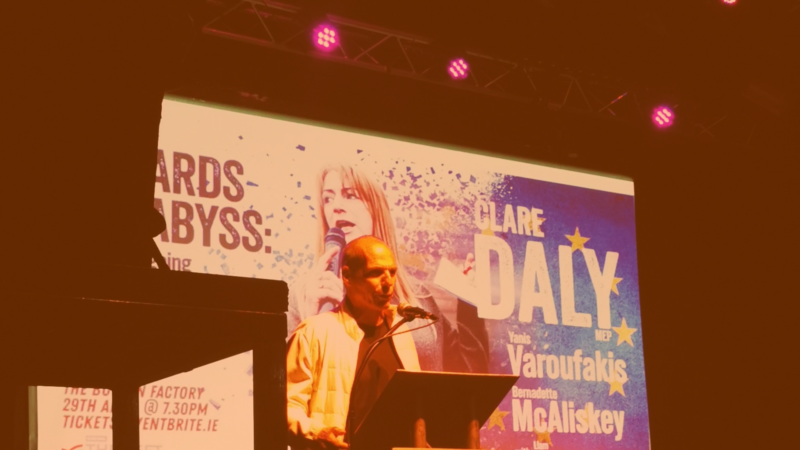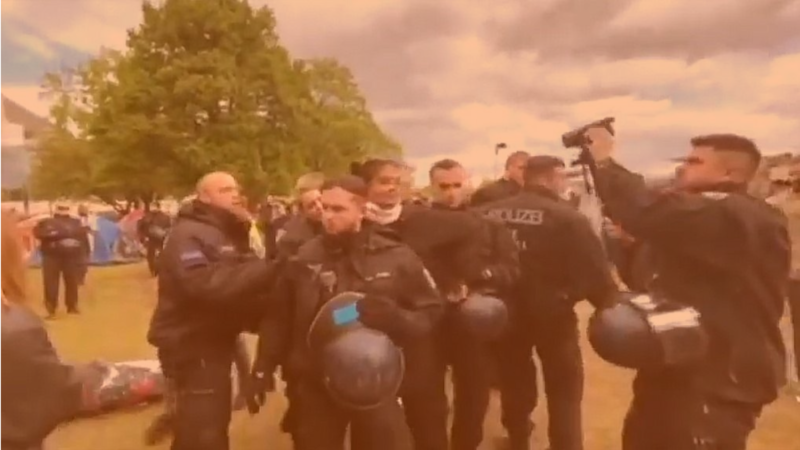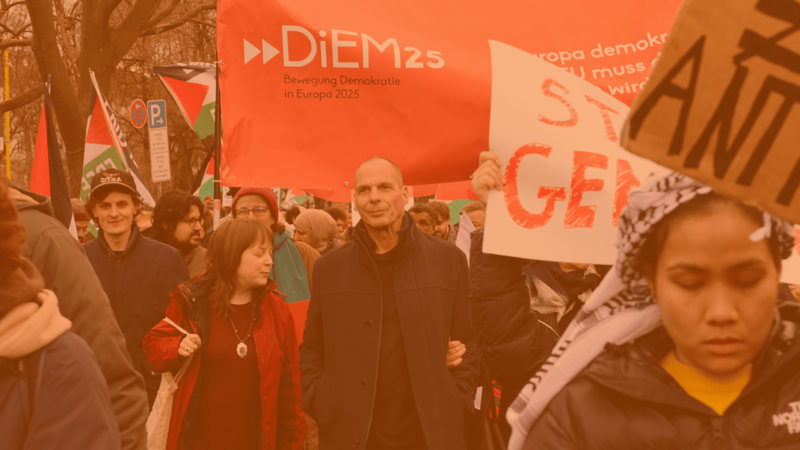On the afternoon of June 26, DiEM25 members and supporters held a demonstration outside Dublin Castle where the Irish government was holding a two-day ‘forum’ on ‘international security’. Our aim was to highlight the alternative approaches for international cooperation and conflict resolution contained in our Athens Declaration, and our peace proposals for Ukraine referencing the example of the Good Friday agreement.
We distributed flyers that included the full text of the Athens Declaration, also mentioning why we should promote Ireland’s policy of neutrality as a contributor to peace internationally, which should be developed into supporting the creation of a New Non-Aligned movement as called for by DiEM25.
We had conversations with other peace activists who were present there, and with people passing by who had not previously heard about the recommendations of DiEM25 and Progressive International for non-alignment and independence from military blocs and forces, such as NATO and a ‘European Army’. The theme of our ‘Action for Peace’ was ‘Yes to Neutrality, no to militarisation’. This was also in solidarity with other peace activist groups and individuals who had been there from 08:00 that morning, raising the call that Ireland should not become hitched to the warmongering NATO bandwagon.
We and other peace activists noted that the line-up of speakers at the ‘forums’ held in Cork, Galway and Dublin was disproportionately made up of strong advocates of a militaristic, belligerent and ‘defeat the enemy at all costs’ approach to the quest for peace and security in the world. The Chair of the forums, who will be responsible for drafting a report to make recommendations about Ireland’s policy of neutrality and non-alignment with military blocs, is a Dame of the British Empire, and criticism has been made about the claim that she is ‘independent’ in this process.
We drafted a submission to the forum, and requested that the government allow us to present it to one of its sessions at Dublin Castle. However, despite Irish government representatives repeatedly publicly stating that they welcomed input from individuals and organisations in ‘a consultative process’, they ignored these requests. We were also refused when we tried to gain entry into the venue, just before staging our on-street Peace Action. The excuse we were given by the security officials at the cordon railings guarding the courtyard entrance was that there was a strict procedure of registering to attend. This confirmed to us that there was tight government control on what views would be allowed to be presented in order to minimise the expression of opposition to the government’s agenda of continuing to undermine neutrality, direct us towards increased militarisation, and get rid of the Triple Lock.
The following are extracts from our submission with some edits for publication purposes:
Peace Forums are needed, not ‘Security Forums’
If the government is genuine about having a peaceful world, where contradictions and contentions are resolved through mutually beneficial diplomacy and dialogue, the title of the consultation process would be ‘Consultative Forum on International Peace Policy’ rather than ‘Consultative Forum on International Security Policy’. The psychology of ‘security’ implies fear and closed mindedness, whereas the psychology of ‘peace’ implies courage and open mindedness.
Citizens Assembly
We believe it would be far more favourable for international peace and security for a Citizens Assembly rather than a public ‘Consultative Forum’ to be held to enable an adequate people’s discussion and democratic decisions to be made in relation to this important topic. Previous Citizens Assemblies set up by our government have shown how effective they can be as a democratic mechanism for resolving questions with complex characteristics in favour of positive and progressive outcomes, and providing pathways to solutions.
Citizen’s Assemblies in Ireland are a useful means of connecting people with democratic processes by facilitating the introduction of an Amendment to our Constitution to be put before the people for consideration and decision. In this case this process could be deployed to have an Amendment to enshrine more solidly the principle of active neutrality with international cooperation, and also clearly stating our policy of non-alignment with military blocs, which are dominated and controlled by a nation with a powerful military apparatus and industrial structure. We call for a Citizens’ Assembly to be held as soon as possible to achieve this aim.
Protect the Triple Lock
To persuade the citizens of Ireland to pass the Nice Treaty in a second referendum held on 19 October 2002, the Seville Declaration was drafted and signed on 21 June 2002 thus legally binding that Irish Defence Forces shall not be deployed abroad from Ireland without the conditions of the Triple Lock being satisfied. The Triple Lock thus secured Ireland’s proud tradition of neutrality that stretched back to Wolfe Tone’s pamphlet in 1790 titled ‘The Spanish War’ opposing Britain’s threat to go to war against Spain and that tradition was repeated by the Irish Neutrality League in 1914 in opposition to Irish participation in World War 1. This tradition is strongly and proudly preserved in Article 29 of Ireland’s Constitution: This clearly states Ireland’s tradition of neutrality is anti-imperialist, anti-colonialist and anti-oligarchic, and is strongly defended by the peace-loving citizens of Ireland.
Uphold international law
The ‘Consultative Forum’ being advocated by Fianna Fail, Fine Gael and actively assisted by the Green Party, can be seen as part and parcel of a propaganda exercise with the main aim of foisting a narrative on the people based on the fallacy that the so-called ‘rules based international order’ is the means to establish and guarantee peace in the world. This ‘rules-based order’ is nothing more than an attempt by self-serving interests represented mainly by the rulers of the G7 and some others, to trample in the mud the aim and intentions of the world’s people who had defeated fascism, and which was articulated in the UN Charter of 1945 ‘to save succeeding generations from the scourge of war’.
Along with other progressive measures, the UN Charter articulates that they wanted to achieve this by establishing “conditions under which justice and respect for obligations arising from treaties and other sources of international law can be maintained”. Instead of bringing peace and security, the forces advocating a ‘rules based international order’ have brought death, displacement, starvation, malnutrition, and poverty to millions of people worldwide. To billions of us, this so-called ‘rules-based order’ means that a tiny minority of super rich and powerful individuals make up the rules to suit themselves based on what they alone see as serving their economic, financial and geo-political interests. The list of the misery and hardship this has brought the world during the past couple of decades includes unlawful aggression, interventions and wars; illegal economic and financial sanctions; illegal occupations by bigger States with military forces; destruction of vital infrastructure; open and covert assassinations of political and governmental officials; suppressing freedom of expression and the rule of law; increased and uncontrollable use of military technologies; expansion of military blocs; negating articles of the Universal Declaration of Human rights including Article 28, which states ‘Everyone is entitled to a social and international order in which the rights and freedoms set forth in this Declaration can be realised’.
The Good Friday Agreement as a template for peace
The Belfast or Good Friday Agreement was not only overwhelmingly endorsed by the people of Ireland but also welcomed by the peoples of the world as an example of how conflicts between and within countries can be addressed, and mechanisms can be put in place to end these conflicts. In situations where there are internal tensions affecting communities who have differing national allegiances, or who feel safer and more protected by the State that they believe their country should be connected to or governed by, the Agreement can be used as a ‘template’ to bring about a governance structure to ensure political equality between communities.
Article 102 of the UN Charter allows for ‘every treaty and every international agreement entered into by any member of the United Nations’ to ‘be registered with the Secretariat.’ Our government, as a member of the UN, and currently as a non-permanent member of the Security Council, should be making good use of this within the UN to promote peace and the termination of conflicts. At the UN meetings, instead of talking down to and lecturing other nations about what they should be doing in their own parliaments, our representatives should be making a more positive contribution by holding up our Good Friday Agreement as a good example of how antagonisms can be decreased and fears allayed.
Supporting and signing up to the Athens Declaration
In 2022 a declaration for international peace and justice through policies underpinned by non-alignment with military blocs was presented by Jeremy Corbyn, Ece Temelkuran and Yanis Varoufakis. We call on all elected politicians and political parties in Ireland to support and endorse this declaration.
Do you want to be informed of DiEM25's actions? Sign up here






